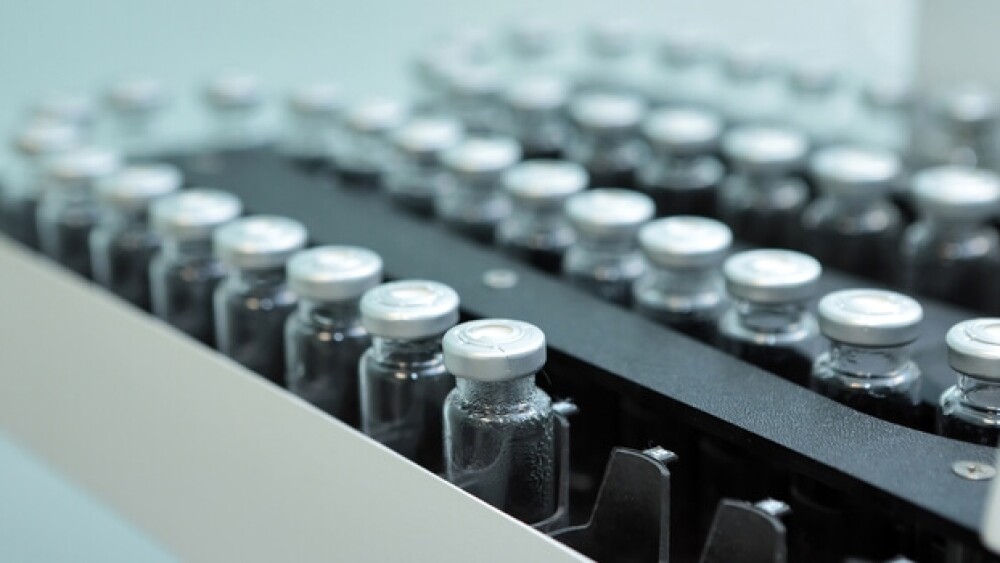With Moderna on the precipice of launching its Phase III trial of 30,000 people for its COVID-19 vaccine, mRNA-1273, it is ramping up manufacturing capabilities.
With Moderna on the precipice of launching its Phase III trial of 30,000 people for its COVID-19 vaccine, mRNA-1273, it is ramping up manufacturing capabilities. The company announced it had partnered with Catalent, which specializes in advanced delivery and manufacturing solutions for drugs. In May, Moderna signed a 10-year strategic collaboration for larger-scale manufacturing of the vaccine with Switzerland’s Lonza.
As part of the latest deal, Catalent will provide vial filling and packaging capacity in addition to more staffing needed for around-the-clock manufacturing at Catalent’s site in Bloomington, Indiana. It has plans for an initial 100 million doses for the U.S. market beginning in the third quarter of this year. They are also in talks to handle fill-finish for continued production of hundreds of millions of additional doses.
In addition, Catalent will provide clinical supply services from its site in Philadelphia, which includes packaging and labeling, as well as storage and distribution in support of the Phase III trial.
“We appreciate this collaboration with Catalent and the flexibility of their team to deliver critical fill-finish capacity for mRNA-1273 at unprecedented speed,” said Juan Andres, Moderna’s chief technical operations and quality officer. “It has been wonderful to see both teams working together to support the common good.”

The Bloomington site is 875,000 square-feet focused on biologics production. It also has a recent expansion for packaging, which offers fully automated, high-speed packaging. It also has expertise in sterile formulation for a wide range of drug types, including liquid and lyophilized vials, prefilled syringes, and cartridges, as well as primary and secondary packaging.
Catalent Biologics also has facilities in Brussels, Belgium and Anagni, Italy that can perform sterile drug product manufacturing and packaging, as well as sites in the U.S. and Europe for manufacturing proteins, viral vectors for gene and cell therapies.
“Catalent is proud to partner with Moderna in its work to address this critical public health need,” said John Chiminski, chair and chief executive officer of Catalent. “Catalent’s proven expertise in manufacturing scale-up and commercial production are well suited to support Moderna’s efforts to prepare for wide-scale supply of this vaccine candidate so that it is available if appropriate to address the pandemic.”
Moderna is generally viewed as being furthest along in developing a vaccine against COVID-19. mRNA-1273 is an mRNA vaccine against SARS-CoV-2 that encodes for a prefusion stabilized form of the Spike (S) protein. The mRNA vaccine is a new type of technology, where the vaccine contains a section of messenger RNA that codes for a protein associated with the virus. The vaccine is injected into a person and the mRNA moves into the test subject’s cells, where the cells then churn out the protein. The body’s immune system should then treat the protein like the virus and attack it, developing an immune response that it will then use if it comes into contact with the actual virus.
The Phase III trial, typically the final stage needed for approval for use, will enroll about 30,000 participants in the U.S. They will be randomized 1:1 to receive either a placebo or the vaccine. The primary endpoint of the trial will be prevention of symptomatic COVID-19 disease, with key secondary endpoints including prevention of severe COVID-19, defined as hospitalization, and prevention of infection by SARS-CoV-2.
The 100-microgram dosage was chosen as the optimal dose level based on data from the Phase I trial. The company indicates it has manufactured enough vaccine to begin the Phase III trial. With the dosage finalized at 100 micrograms, it believes it could deliver about 500 million doses annually, and potentially up to 1 billion doses per year starting in 2021 between its internal U.S. manufacturing site, its collaboration with Switzerland-based Lonza, and the new deal with Catalent.
“We look forward to beginning our Phase III study of mRNA-1273 with some 30,000 participants in July,” said Tal Zaks, Moderna’s chief medical officer. “Moderna is committed to advancing the clinical development of mRNA-1273 as safely and quickly as possible to demonstrate our vaccine’s ability to significantly reduce the risk of COVID-19 disease.”





